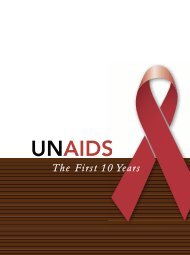Task Shifting - Global Recommendations and Guidelines - unaids
Task Shifting - Global Recommendations and Guidelines - unaids
Task Shifting - Global Recommendations and Guidelines - unaids
Create successful ePaper yourself
Turn your PDF publications into a flip-book with our unique Google optimized e-Paper software.
<strong>Recommendations</strong> on ensuring quality of care<br />
retain skilled workers in the health system <strong>and</strong> contribute to recruitment among the more highly<br />
qualified cadres as health workers add to their skill set <strong>and</strong> seek promotion.<br />
Advantages:<br />
• The use of certification mechanisms, such as practical skills-based assessments or exams,<br />
provides a means of identifying gaps in the knowledge <strong>and</strong> skills of health workers.<br />
• Registration of health workers, <strong>and</strong> especially non-professional health workers, legitimizes a<br />
cadre <strong>and</strong> allows for a licensing <strong>and</strong>/or regulatory body to maintain institutional responsibility<br />
for the cadre.<br />
• Career frameworks can assist in workforce planning.<br />
Uncertainties:<br />
• While there are abundant data reflecting the positive impact of certification of professional<br />
health workers in high-income countries as a means of continuing professional development<br />
<strong>and</strong> quality assurance, there is a general dearth of such data from resource-constrained<br />
countries, <strong>and</strong> far fewer related to the field of HIV medicine.<br />
Selected examples of experience/additional resources:<br />
Malawi links specific in-service training for the delivery of HIV services to a st<strong>and</strong>ardized <strong>and</strong><br />
nationally endorsed process for certification. Non-physician clinicians <strong>and</strong> nurses undergo a fiveday<br />
training in the initiation of antiretroviral therapy, which is followed by a certification exam. The<br />
Medical Council or Nursing Council then approves the extension of the scope of practice of each<br />
non-physician clinician or nurse who successfully completes the exam so that they can prescribe<br />
antiretroviral therapy.<br />
Recommendation 11<br />
Supportive supervision <strong>and</strong> clinical mentoring should be<br />
regularly provided to all health workers within the structure<br />
<strong>and</strong> functions of health teams. Individuals who are tasked<br />
with providing supportive supervision or clinical mentoring<br />
to health workers to whom tasks are being shifted should<br />
themselves be competent <strong>and</strong> have appropriate supervisory<br />
skills.<br />
Comment: This recommendation gives high value to the importance of having a structured<br />
support system in place for the successful implementation of task shifting, specifically<br />
supportive supervision. This recommendation recognizes that task shifting will create new <strong>and</strong><br />
additional responsibilities for supervision. These additional responsibilities should be reflected<br />
in job descriptions <strong>and</strong> scopes of work. The need for supportive supervision may require the<br />
deployment of additional health workers. Concerted efforts will be needed to provide on-site<br />
or technology-facilitated supportive supervision for health workers in rural areas.<br />
Summary of findings<br />
It is widely recognized that support for health workers through supervision, mentoring <strong>and</strong><br />
teamwork improves the quality of care across the spectrum of health services 65 66 96 97 99 100 138 .<br />
31

















